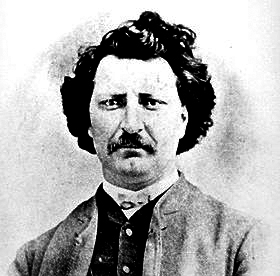
On Nov. 16, 1885, Louis Riel, a leader of the Métis people in their resistance against the Canadian government in the Canadian Northwest, was hanged for treason. He remains perhaps the most controversial figure in Canadian history. His life and deeds have spawned a massive and diverse literature.
Riel was born in the Red River Settlement (now Manitoba) in 1844. After exploring the priesthood and the law, he returned home and emerged as a leader among the Métis people. In 1869-70 he headed a provisional government, which would eventually negotiate the Manitoba Act with the Canadian government. The Act established Manitoba as a province and provided some protection for French language rights.
Although chosen for a seat in the House of Commons on three occasions, he was unable to take his seat. In 1884, while teaching in Montana at a Jesuit mission, Riel was asked by a delegation from the Métis community to present their grievances to the Canadian government. Despite Riel’s assistance, the federal government ignored Métis concerns. By March of 1885, Métis patience was exhausted and a provisional government was declared.
Riel was the undisputed spiritual and political head of the short-lived 1885 Rebellion. On May 15 Riel surrendered to Canadian forces and was taken to Regina to stand trial for treason. Riel’s leadership in the agitation, especially his decision to execute a Canadian named Thomas Scott, enraged anti-Catholic and anti-French sentiment in Ontario.
At his trial, Riel gave two long speeches which demonstrated his powerful rhetorical abilities. He personally rejected attempts by his defense counsel to prove he was not guilty by reason of insanity. A jury of six English-speaking Protestants found Riel guilty but recommended mercy. Judge Hugh Richardson, however, sentenced him to death. Appeals were dismissed and a special re-examination of Riel’s mental state by government appointed doctors found him sane. He was hanged in Regina.
Politically and philosophically, Riel’s execution has had a lasting effect on Canadian history. He became the martyr of the Métis people. In Central Canada, the political fallout from Riel’s hanging enlivened French Canadian nationalism. Riel’s death also caused a fundamental shift in Québec voting trends, moving the province’s traditional support of the Conservative Party to the Liberal Party led by Wilfrid Laurier.
Riel’s execution remains a contentious issue, and demands for his retroactive pardon have been made on a number of occasions. Far from the days where Riel was a hated “traitor” and “murderer,” Riel has been recognized as a Father of Confederation, as a wronged man, as a defender of his people, and as a protector of minority rights in Canada. A number of statues commemorate him in his home province, and in 2007, Manitoba recognized him with a public holiday held each February.
For the Métis, November 16 is a national public commemoration of Riel’s life and struggles.
For many, Riel has become a Canadian hero, as he embodies many contemporary issues in the country – bilingualism, multiculturalism, tolerance for difference, and a keen sense of social justice. However, Riel was very cautious of the Canadian national project, seeing it as assimilatory as much as unifying. Some Métis critique the zeal with which Riel has been Canadianized and how this appropriation is often at odds with Riel’s belief in Métis nationalism and political independence.
Adapted from The Northwest Resistance, A database of materials held by the University of Saskatchewan Libraries and the University Archives
Photo: Louis Riel, circa 1873 (courtesy Provincial Archives of Manitoba/N-5733).

MOST POPULAR TODAY

High Court essentially bans demonstrations, freedom of assembly in Deep South

UN warns that Israel is still blocking humanitarian aid to Gaza

Resource wars rage in eastern Congo, but U.S. capitalism only sees investment opportunity

U.S. imperialism’s ‘ironclad’ support for Israel increases fascist danger at home







Comments